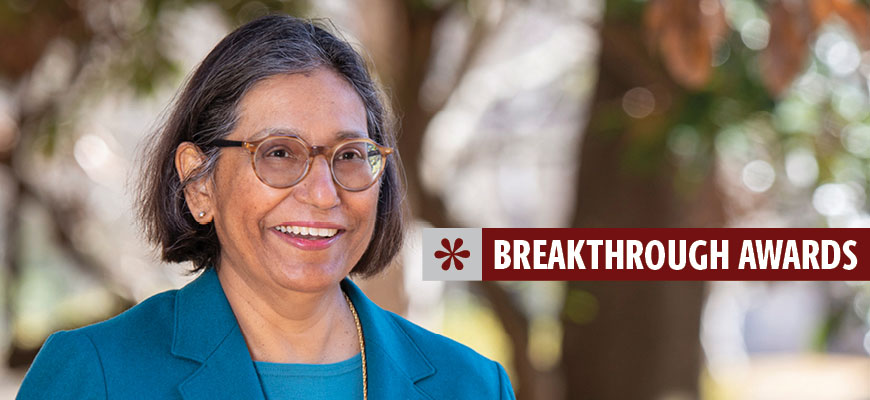
Breakthrough Leader: Bernardine Pinto
Nursing professor is research role model
Posted on: April 5, 2021; Updated on: April 5, 2021
By Craig Brandhorst, craigb1@mailbox.sc.edu, 803-777-3681
Bernardine Pinto’s research is well documented. A professor in the College of Nursing since 2014, and the college’s associate dean for research, she has built an international reputation for her work studying and promoting the effects of exercise on the health and well-being of cancer survivors and boosted her college’s reputation in the process.
To date, she has published more than 100 articles in the leading journals in her field and delivered more than 150 presentations. Her cross-sectional, longitudinal assessment studies and intervention trials have meanwhile generated millions of dollars in grant funding from the National Cancer Institute, the American Cancer Society, the National Institute on Aging, the National Heart, Lung and Blood Institute and the Lance Armstrong Foundation.
“Dr. Pinto exemplifies precisely what is needed to role model and increase our research and grant productivity,” says College of Nursing Dean Jeanette Andrews, who recruited Pinto from the Alpert School of Medicine at Brown University seven years ago and has watched her blaze a wide path ever since.
“I value her leadership, her innovative thinking to foster research at the College of Nursing and the strength of her scientific work,” says Andrews. “She enhances the mission of the college and the university and has made significant contributions that reflect favorably on the university’s reputation.”
But when it comes to leadership, Pinto’s biggest impact might come in the form of her mentorship, which to her mind is almost as important as the work she does with cancer survivors themselves.
From Honors College undergraduates, graduate students and postdocs working on her grant-funded projects to promising young faculty at the College of Nursing, Pinto puts in plenty of hours helping the next generation of nursing scientists. “Over time, they are the ones who are going to be developing and leading the science,” she says.
When I read the feedback from participants at the end of a study, we are looking at not only what we have done, but what the study meant to the patients, to their lives and well-being, and their family’s well-being. To me, that is the most important thing.
Bernardine Pinto
Along with an eagerness to team up with Dean Andrews’ and support the then-new dean’s research vision, it’s one of the principal reasons Pinto came to the University of South Carolina in the first place. “I didn’t want to abandon my own research, but I wanted to grow my own skills and contributions,” she says. “That’s where the mentorship of faculty as well as students comes in.”
That work has taken many forms. To expose faculty and students to cutting edge methodology in science, she regularly invites experts from around the country to present workshops.. And within the College, she hosts a research forum series and meet-and-greets for clinical faculty to engage with research faculty. “You know, these silos — ‘I’m research, you’re clinical’— I don’t believe in that,” she says. “I believe that everybody has strengths that they can bring to the table.”
Pinto also hosts meet-and-greets between the College of Nursing and other university units, such as the College of Engineering and Computer Science and the College of Information Science.“Our faculty usually partner with other nursing faculty, with public health, pharmacy, social work and School of Medicine. They don’t usually work with these non-traditional partners,” she says. “But for science to progress, you need to have interdisciplinary work, you need to build upon the strengths and training that other disciplines offer.”
Pinto speaks from experience and leads by example. A clinical psychologist by training, she tracks her patients’ lives throughout each study. And while her expanded research agenda and leadership role may have reduced face-to-face patient contact, she meets with her staff on a weekly basis to discuss their study participants’ progress in becoming and staying physically active but also their emotional well-being.
“When I read the feedback from participants at the end of a study, we are looking at not only what we have done, but what the study meant to the patients, to their lives and well-being, and their family’s well-being,” she says. “To me, that is the most important thing. If we don’t also have that positive impact on a person’s life, then I don’t know whether I would be as keen on it.”
And she wants her colleagues and staff to develop a similar keenness. Recently, she even put together and distributed a Shutterfly book of patient testimonials as a way to remind everyone that their work has real-world meaning.
“Out of the study that just ended, I put together testimonials from our participants which I give to all of my staff,” she says. “Because sometimes you work and you think, ‘Have I really helped people?’ I pulled together this book so that they can open it and say, ‘Yes, I collected data. Yes, I worked on this study. But I also helped people.’ That’s what this is really all about.”
Share this Story! Let friends in your social network know what you are reading about